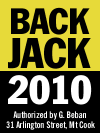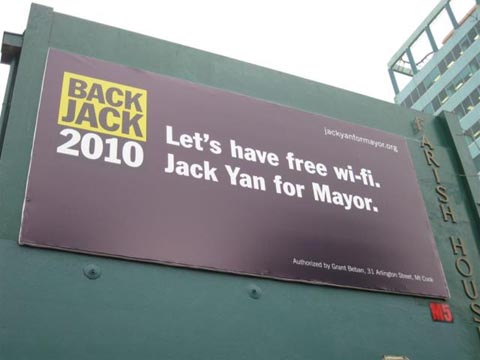 Certain media are reporting the city’s [debt] in the $200 million–$300 million mark but our outside-council research reveals this is a very conservative estimate. It’s likely to be more.
Certain media are reporting the city’s [debt] in the $200 million–$300 million mark but our outside-council research reveals this is a very conservative estimate. It’s likely to be more.
Regardless of whether it’s $200 million or half an (American) billion (scary just saying it), any deficit that’s nine digits long can’t be good for a relatively small city.
One of my plans after I get into office will be to balance the budget, which is why I have been going on about growing jobs and businesses in such a big way. In a very shortcut way of explaining it: more new businesses, more ratepayers, fewer reasons to increase the rates. Which, I might add, this current administration has already locked in for us over the next few years, letting the next mayor get the blame.
I object to any cuts in library services, even if there is a strong denial that that is happening. In a knowledge economy, we cannot afford to create a class system of the knowledge-rich and the knowledge-poor.
On this note, recently I asked Don Christie of the New Zealand Open Source Society to examine an open-source strategy for Wellington City. For starters, we discussed how the library software is a proprietary system that costs this city a considerable amount—when there is a New Zealand-developed open-source program that many other cities have implemented.
While it would be nice to keep believing we can afford expensive software to run city services, I don’t like debt, and I certainly don’t like owing people any money.
And I’m not prepared to sell off our water to technocrats or any profitable part of the family jewels to see the hundred-million figure reduced.
There are good examples of open source working for cities and creating significant savings. Zaragoza, Spain, has been moving to a complete open-source desktop. And it’s not the only one.
Furthermore, open source will mean jobs in Wellington. This will mean new jobs. I have already gone on about the tech clusters being a vital part of this city’s economy. Open-source skills are in high demand, and if overseas trends are anything to go by, we can attract these skilled people to our city. Already Wellington is a centre of excellence in many IT-related fields. I’m talking about extending this and making a real claim to open-source. Let the world know that Wellington is the home of not just the most advanced software and visual effects’ companies, but logically extend that to open source as well.
It’s projected that by 2020, 40 per cent of jobs in IT will be open-source-related, so if we don’t do it, another New Zealand city will. I’m not about to give up one of our most important advantages, one which has been emerging in the capital since the 1990s.
Such moves can be done with the city and Wellington’s private enterprises working together—but this will need to come from the top, and be put in motion by a mayor who’s passionate about job creation. It’s one of the biggest challenges we face, and I seem to be a lone voice on focusing on this for our city.




Jack – I assume that you (again) are using deficit when you mean debt?
http://en.wikipedia.org/wiki/Deficit
Yes, slip of the thoughtstream, though I wouldn’t rely on Wikipedia.
When was the other time?
However, regardless of one word, I take it that you agree that the substantive argument still holds. The city is in a dire financial position and this is one logical solution.
The first was over twitter and I pulled you up on it then too! I hear you on wikipedia, but it was the first reference that jumped to mind. I wouldn’t use it for a controversial definition though.
Yeah, your point is right, but it’s a very important difference. It sounds like scaremongering to say we face a $200million deficit, when that is simply not true.
Having said that, accept it’s an innocent mistake.
I recall a discussion about what period the debt referred to, but not about deficit v. debt. Still, I accept there is a distinction.
Open source is near and dear to my heart, and I’ll freely admit I moved to it because I was too poor to keep using proprietary programs.
It seems so much movement towards integrating open source is happening outside my home nation of the United States (Europe and Africa, I think). I don’t completely understand why save maybe some misguided ideas about how open source and capitalism doesn’t mix.
I worked for city hall, once. I’m guessing Wellington is better able to handle it than Richland, Washington, USA is. My supervisors at the time are still excellent professionals, but a few of them are not very tech-savvy, and I think they’d freak if software changed, especially a shift from Windows to Linux.
I did think about it, though, since the citizens are quite famously dissatisfied with their government and gripe about city council every chance they can get, especially over budget decisions.
When I was there, we moved the city website away from the mess created in MS FrontPage and switched to Lockheed Martin’s Rapidwebex; the company happens to be a current contractor for the Hanford site. A program called “SurfControl” was implemented to restrict web use; I have no idea if it works for browsers other than IE.
The time was 2003-2006, if I remember right, and I was using Windows 2000 from my desk, and not everyone had been switched over to XP, if that’s any indication. I also got a hand-me down box from one of my supervisors (my previous one was aging badly and frequently ran out of memory on photo projects).
Jack,
I find the statement “While it would be nice to keep believing we can afford expensive software to run city services” to be most troubling.
It’s not about the costs of providing the service, it’s about using the best solution for the given problem. Just because a product is expensive, doesn’t mean it’s the best solution, and vice versa.
Open source is not free, there are costs associated with implementing any IT solution. What Open source doesn’t suffer from is licensing costs. You have to weigh up the costs associated with each solution along with their ability to meet your requirements. At the end of the day it’s best to have the right solution than one you’ll make do with.
However I do applaude you for bringing open source into the debate. There are some amazing solutions offered by the Open Source community that are neglected by a lot of people for purely ignorant reasons.
I wish you the best of luck.
Zeit.
Jack
Excellent piece, thanks. As much as I strongly believe in the values and freedom of free software I expect it will take more than changing Council over to free and open source software to repay the debts. Stimulating more home grown IT in Wellington will go some way to help bridge the gap.
Cheers…Colin
Jak, thank you for sharing your experiences.
Zeit, I share your concerns and I will be weighing these up as we need to be careful about the Council’s spending of ratepayers’ money. I realize (as a corporate user) that FLOSS is not free, though in many cases—the libraries are but one example—what is on offer from the community is superior.
Colin: you are quite correct. One of the biggest policies I am presenting to voters is job creation, especially with the tech cluster programme. I believe in building business from the ground up, and the most ready sectors for that are tech and creative.